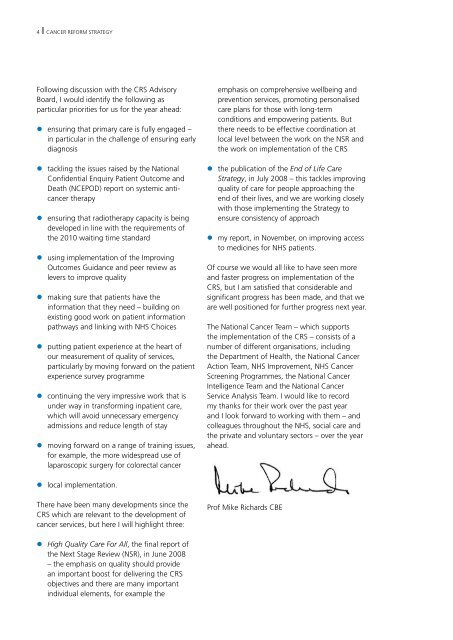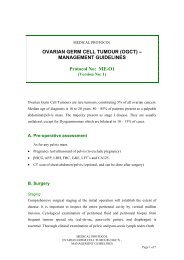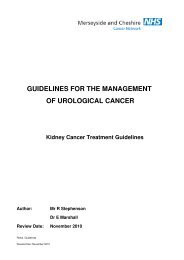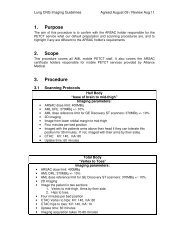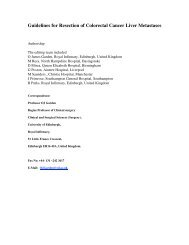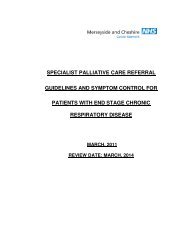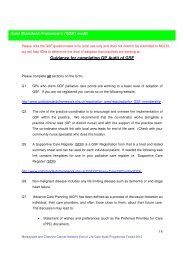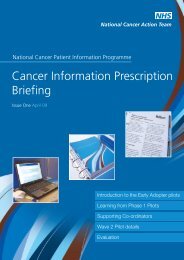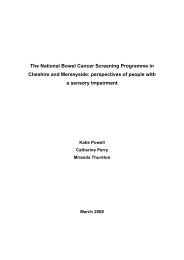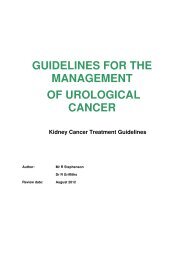Cancer Reform Strategy - First Annual Report - Merseyside ...
Cancer Reform Strategy - First Annual Report - Merseyside ...
Cancer Reform Strategy - First Annual Report - Merseyside ...
You also want an ePaper? Increase the reach of your titles
YUMPU automatically turns print PDFs into web optimized ePapers that Google loves.
4 CANCER REFoRM STRATEgyFollowing discussion with the CRS AdvisoryBoard, I would identify the following asparticular priorities for us for the year ahead:• ensuring that primary care is fully engaged –in particular in the challenge of ensuring earlydiagnosis• tackling the issues raised by the NationalConfidential Enquiry Patient outcome andDeath (NCEPoD) report on systemic anticancertherapy• ensuring that radiotherapy capacity is beingdeveloped in line with the requirements ofthe 2010 waiting time standard• using implementation of the Improvingoutcomes guidance and peer review aslevers to improve quality• making sure that patients have theinformation that they need – building onexisting good work on patient informationpathways and linking with NHS Choices• putting patient experience at the heart ofour measurement of quality of services,particularly by moving forward on the patientexperience survey programme• continuing the very impressive work that isunder way in transforming inpatient care,which will avoid unnecessary emergencyadmissions and reduce length of stay• moving forward on a range of training issues,for example, the more widespread use oflaparoscopic surgery for colorectal canceremphasis on comprehensive wellbeing andprevention services, promoting personalisedcare plans for those with long-termconditions and empowering patients. Butthere needs to be effective coordination atlocal level between the work on the NSR andthe work on implementation of the CRS• the publication of the End of Life Care<strong>Strategy</strong>, in July 2008 – this tackles improvingquality of care for people approaching theend of their lives, and we are working closelywith those implementing the <strong>Strategy</strong> toensure consistency of approach• my report, in November, on improving accessto medicines for NHS patients.of course we would all like to have seen moreand faster progress on implementation of theCRS, but I am satisfied that considerable andsignificant progress has been made, and that weare well positioned for further progress next year.The National <strong>Cancer</strong> Team – which supportsthe implementation of the CRS – consists of anumber of different organisations, includingthe Department of Health, the National <strong>Cancer</strong>Action Team, NHS Improvement, NHS <strong>Cancer</strong>Screening Programmes, the National <strong>Cancer</strong>Intelligence Team and the National <strong>Cancer</strong>Service Analysis Team. I would like to recordmy thanks for their work over the past yearand I look forward to working with them – andcolleagues throughout the NHS, social care andthe private and voluntary sectors – over the yearahead.• local implementation.There have been many developments since theCRS which are relevant to the development ofcancer services, but here I will highlight three:Prof Mike Richards CBE• High Quality Care For All, the final report ofthe Next Stage Review (NSR), in June 2008– the emphasis on quality should providean important boost for delivering the CRSobjectives and there are many importantindividual elements, for example the


